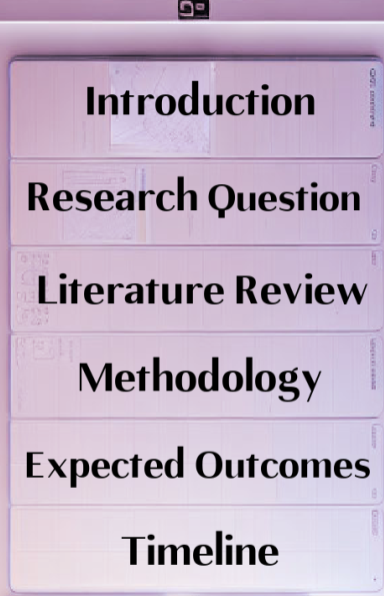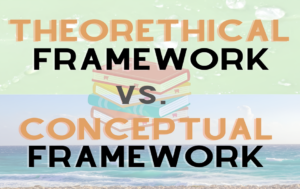What is a research proposal?
What is a research proposal, you may ask? Well, a research proposal is like a sales pitch, but for your research. It’s your chance to convince others that your study is worth funding or carrying out. Think of it like a movie trailer, you want to grab people’s attention and give them a taste of what’s to come. In this write-up, I introduce you to a hack for writing a great research proposal.
At its core, a research proposal is a document that outlines what you want to study, why it’s important, and how you plan to do it. It’s like a roadmap that guides you through the research process and helps you stay on track.
Let’s break it down further. A good research proposal typically includes the following components:
Title
A catchy, informative title that gives readers a clear idea of what your study is about.
Introduction
An overview of the research problem, including its significance and relevance to the field. This section should also include your research question and or hypothesis.
Literature review

One of the tricks for crafting an excellent research proposal is having a great understanding of the area. A literature review is a summary and analysis of the existing research on the topic. It shows your understanding of the area and the gaps in knowledge that your study will address.
Methodology
A detailed explanation of how you plan to conduct your research. It includes your research design, sampling strategy, data collection methods, and analysis techniques. Your methodology is one of the strategies for producing an impressive research proposal. Thus, I refer to it as the spine of your proposal.
Expected outcomes
A description of the potential results of your study and how they will contribute to the field.
Timeline
A proposed timeline for carrying out the research, including milestones and deadlines.
Budget
A breakdown of the expected costs of carrying out the research, including funding sources.
Now, let’s look at some practical examples to help you understand what a research proposal looks like in action.
Example 1:
Let’s say you’re interested in studying the effects of social media on mental health. Your research proposal might include a title like “Scrolling for Sanity: Investigating the Relationship Between Social Media Use and Mental Health.”
In the introduction, you would explain why this topic is important and outline your research question: Does social media use have a negative impact on mental health?
Your literature review would summarize the existing research on the topic, while your methodology section would describe how you plan to collect and analyze data. You might propose using a survey to collect data from social media users and analyzing the results using statistical techniques. Finally, you would outline the potential outcomes of your study and the expected timeline and budget.
Example 2:
Let’s say you’re interested in studying the effectiveness of a new teaching strategy in improving student learning outcomes.
Your research proposal might have a title like “Teaching for Tomorrow: Assessing the Impact of a Blended Learning Approach on Student Achievement.”
In the introduction, you would explain why this topic is important and outline your research question: Does a blended learning approach lead to improved student learning outcomes?
Your literature review would summarize the existing research on teaching strategies, while your methodology section would describe how you plan to collect and analyze data.
You might propose using a mix of surveys and assessments to collect data from students and analyzing the results using qualitative and quantitative techniques. Finally, you would outline the potential outcomes of your study and the expected timeline and budget.
Remember to be clear, concise, and persuasive in your proposal – just like a good sales pitch or movie trailer!
Importance of a strong graduate school research proposal
Picture this:
You’re a graduate student with an amazing research idea, but you can’t seem to get anyone on board. That’s where a strong graduate school research proposal comes in. It’s your ticket to getting your study funded, accepted, and carried out. But why is it so important?
First and foremost, a strong research proposal shows that you have a clear and well-thought-out plan for your study. It demonstrates that you have a deep understanding of the research problem and have carefully considered the best way to approach it. This not only makes it more likely that your proposal will be accepted but also increases the chances that your study will be successful.
A well-crafted research proposal also helps you stay on track throughout the research process. By outlining your research question, methodology, and expected outcomes, you have a roadmap to follow. Basically, it avoids getting sidetracked or overwhelmed. This saves you time and energy and ensures that you’re focusing on the most important aspects of your study.
Additionally, a strong research proposal can open doors for you in your career. If your study is funded or accepted, it can lead to new opportunities for research, collaboration, and networking. It can also help you establish yourself as an expert in your field and increase your credibility as a researcher.
Now, let’s look at some practical examples to help you understand the importance of a strong graduate school research proposal in action.
Example 1:
Let’s say you’re a graduate student in the field of public health. And you want to study the impact of a new community health program on reducing rates of obesity.
A strong research proposal would outline your research question, such as “Does participation in a community health program lead to a reduction in obesity rates?” It would also explain why this study is important and how it fills a gap in existing research.
Your methodology section would detail how you plan to collect and analyze data. For example, using surveys and physical measurements, and your expected outcomes would describe the potential impact of your study on public health. A proposal like this would increase the likelihood of your study being funded or accepted. It may lead to future opportunities for research collaboration in the field of public health.
Example 2:
Assuming you’re a graduate student in the field of education. You then decide to study the effectiveness of a new teaching strategy on student learning outcomes. A catchy research proposal would outline your research question, ie. “Does a blended learning approach lead to improved student learning outcomes?” It would then explain why this study is important and how it fills a gap in existing research.
Your methodology section would outline how you plan to collect and analyze data. You may use surveys and assessments, and your expected outcomes would describe the potential impact of your study on education.
In brief, a good graduate school research proposal is a prerequisite for getting admission as well as securing funding. The proposal demonstrates how your presence will contribute immensely to the faculty or university as a whole.
You may also be interested in:
How to write an academic résumé
Overview of the key elements of a successful research proposal

When it comes to crafting a successful research proposal, there are several key elements that you need to include. These elements not only help you clearly communicate your research idea but also demonstrate that you have a well-planned and thoughtful approach to your study.
Introduction
This section should provide an overview of the research problem and its significance. You need to explain why your study is important, what gap it fills in existing research, and what contribution it can make to your field. For example, if you’re proposing a study on the impact of social media on mental health, your introduction should explain why this topic is important and what existing research has not addressed.
Research Question
This section should clearly state your research question and explain how it relates to your research problem. Your research question should be specific, focused, and answerable. For example, if your research problem is the impact of social media on mental health, your research question could be “How does social media use relate to depression and anxiety in young adults?”
Literature Review
This section should provide a critical review of the existing literature on your research problem and question. You need to demonstrate that you have a deep understanding of the current state of research and how your study fits in. For example, if you’re proposing a study on the impact of social media on mental health, your literature review should summarize the current research on this topic and highlight any gaps that your study can fill.
Methodology
This section should explain how you plan to conduct your study, including your research design, data collection methods, and data analysis techniques. You need to demonstrate that you have a clear and appropriate plan for carrying out your research. For example, if you’re proposing a study on the impact of social media on mental health, your methodology should explain how you plan to collect data (e.g., surveys, interviews, etc.) and analyze it (e.g., statistical analysis).
Expected Outcomes
This section should describe what you expect to find from your study and how it will contribute to your field. You need to demonstrate that your study has the potential to make a significant contribution to knowledge. For example, if you’re proposing a study on the impact of social media on mental health, your expected outcomes should describe how your study can inform interventions to improve mental health outcomes.
Download the Cambridge University research proposal guide here
Timeline
This section should provide a detailed timeline for your study, including milestones and deadlines. You need to demonstrate that you have a feasible plan for carrying out your research within a reasonable timeframe. For example, if you’re proposing a study on the impact of social media on mental health, your timeline should include when you plan to collect data, analyze data, and write up your findings.
In summary, a successful research proposal requires a clear and well-planned approach, which includes key elements such as an introduction, research question, literature review, methodology, expected outcomes, and timeline. By including these elements, you can demonstrate that your study is important, feasible, and has the potential to make a significant contribution to your field. So, take the time to carefully craft each of these elements – it will pay off in the end!













